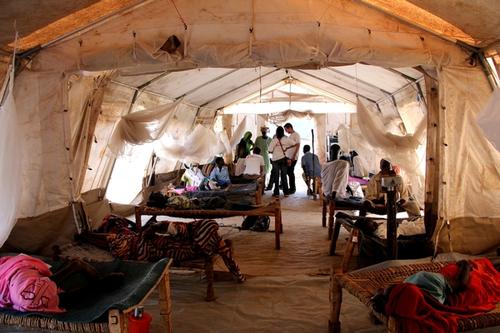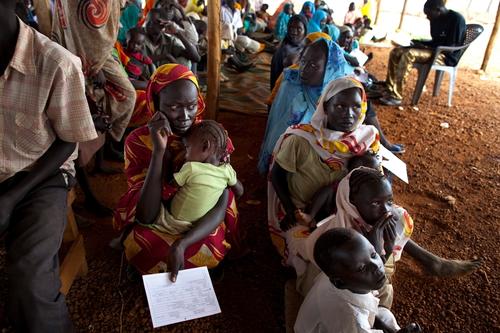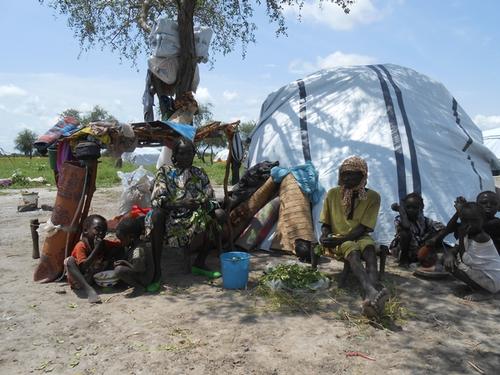Dr Deirdre Lynch is an Irish General Practitioner currently working with Médecins Sans Frontières (MSF) in Batil camp, South Sudan where 38,000 people have sought refuge from fighting and violence in neigbouring Sudan.
On World Refugee Day, she describes life in the camp, and the challenges facing the refugees and the MSF team who are trying to provide life-saving medical care in an extremely tough environment.
First impressions
I had some images in my mind of what to expect before I arrived, but seeing the reality of a camp that is home to 38,000 refugees, combined with the tough environmental and living conditions here was initially overwhelming.
Batil camp is situated in Maban County, in the north east of South Sudan (the worlds’ newest country) and on the border with Sudan. During dry season the land is arid and covered with dusty clay soil. But the camp is located on a flood plain, and after rainfall the result is thick glue-like mud everywhere. Stagnant pools of water are the perfect harbour for many diseases, and of course, mosquitoes.
Healthcare at the coalface
In our field hospital, MSF is providing 24 hour healthcare services for the refugee population of Batil and Gendrassa camps. The living conditions in this setting naturally leave the refugees in a very precarious state health-wise. The care that we provide here spans a broad range of needs from looking after newborns, to general pediatrics, to maternity care, to general adult medicine, a nutrition programme and also mental health.
On a weekly basis we see on average 1,000 patients, both adults and children, with illnesses such as pneumonia, diarrhoea, dehydration and malnutrition. We care for patients with Kala-Azar, a disease endemic in South Sudan and the second largest global parasitic killer after malaria. We also see people suffering with other infectious diseases such as TB, brucellosis and typhoid.
Recently we treated several children with measles; this week MSF is leading a mass measles vaccination campaign in the camp to stem the outbreak. We also treat people who have sustained injuries due to the living environment - burns from open cooking fires and complications from snake or scorpion bites are common.
Our outreach teams, who have their fingers on the pulse of the camp, see an overall improvement in the nutritional health of the children. The work MSF is doing here is visibly making an impact and childhood mortality rates are now much lower compared to this time last year. The health of the population has definitely improved but it will always be fragile in this environment.
Challenges
The population here will be very vulnerable in the rainy season over the next few months. The tents and plastic sheeting will only provide limited protection from the heavy rains. Flooding is likely and we expect to be very busy looking after patients with multiple illnesses.
There are many moments here that are heartbreaking. Witnessing the death of a child affects us all. I particularly remember one seven-year-old girl we treated recently for severe kala azar and malnutrition who succumbed to this illness despite our best efforts. This little girl had a fighting spirit and even in the days before she died would ask for a spoon of sugar from the staff before she would take her medicines. She made an impact on all of us who cared for her.
Maternal deaths are also extremely sad to see. The Hepatitis E infection in pregnant women has a mortality rate of approximately 20% and many young children are left in the care of the extended family if the mother dies. The Hepatitis E outbreak caused a lot of fear within the camp and had a significant impact on the physical health of the population.
Stoicism of the refugees
MSF employs many of refugees to work in our clinic. Ahmed* is a 24 year-old ward assistant who helps with patient care in the clinic. He is a bright young man and a great colleague to work with. Last year he left the Blue Nile State, in Sudan, with his wife and three children along with his parents and siblings. Some of his extended family members had already moved to Maban County, walking for weeks to escape the fighting in Blue Nile.
Ahmed becomes emotional when he talks about a close family member who was shot when their village was attacked. He finds it difficult to talk about the suffering he witnessed and he worries about his family and friends back home who did not leave.
Ahmed wants to educate himself further and is determined to attend nursing school. He has plans and dreams. For now though, he has made his home here in the camp and is trying to move forward for himself and his family. I asked him how he copes with the current situation he and his young family live in. He replied ‘If I think about how hard everything is here it just becomes ten times harder’. He is trying to keep positive to rebuild his life. Ahmed for me symbolises the refugee’s stoical, resilient spirit against all the odds.
*The name has been changed






